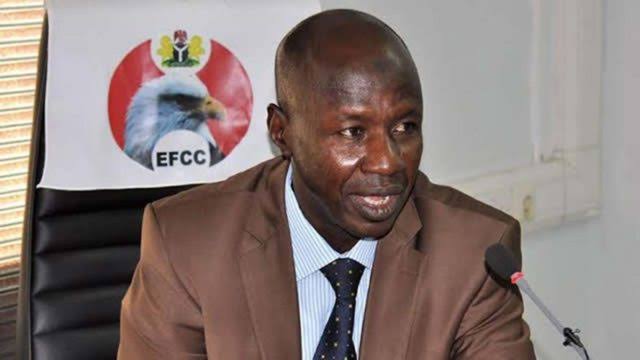
The suspended Ag. Chairman of the Economic and Financial Crimes Commission, EFCC, Ibrahim Magu, dismissed the preliminary mystery and his avoidance of numerous meetings where many opposing observers were greeted by the judicial inquiry commission to assert against him by Justice Ayo Salami-led board.
Magu, in a 16-page appeal, dated August 10, 2020 and forwarded to Justice Ayo Salami, also rejected the board’s refusal to prevent its lawyers from numerous commission proceedings, describing the activity as a deliberate attempt to deny him a reasonable hearing.
In the dossier, Magu lamented that the head of the commission was in opposition to the soul and letter of section 2 (D) of the investigative tribunal law which the chairman relied on to set it up.
The letter, which was marked by his legal advisor, Wahab Shittu, noted that despite the legal executive council building protest, he had since its inception on July 3, 2020, reliably conducted its proceedings in private, including that most of the observers were analyzed without the presence of Magu who is really the subject of the request.
He noted that when Magu was recently allowed access to the proceedings with his counsel, he was not allowed to question the observers the council called to assert his opposition.
Legal counsel said: “Our client and his insights were explicitly excluded from the proceedings of the eleventh, twelfth and thirteenth of July 2020, among others despite their standing at the venue”.
“In all the times of barring legal commission proceedings, witnesses were called, confirmed and cross-examined and cases offered without his client and his instructions. It should be noted that the idea of claims against our client is criminal”.
“Thus his constitutional privilege of a reasonable hearing should not have been grossly abused under the conditions presented thus far by the committee.
“This cancels the Instrument of Settlement specifying that the Legal Complaint Commission is designated as the instrument establishing a Legal Complaint Commission for the examination of Ibrahim Magu, the acting chairman of the EFCC, for alleged ill-treatment in the office and botched government resources recovered from May 2015 to May 2020.
“Undeniably from the above, our client is the subject of the request and to avoid the presence of our client and his advice in any of the proceedings is a flagrant violation of the communicated letters of the Instrument of Agreement dated July 3, 2020, as well as the strengths given by the Tribunal of Inquiry Act 2004”.
Magu further complained about the non-organization of the pledge by the commission on observers of which it had gathered evidence since the start of the preliminaries, saying that the commission had also ignored a mandatory necessity of the law covering these preliminaries to the Nigeria.
He further blamed the commission for denying him double the demands he was tempted to and the commission’s mandate for just days before the end of its 45-day session. It depended on the repeated request that a duplicate ToR be served to our client on August 8, exactly 35 days after the committee meeting.
He said, “As a result, our client was denied the opportunity to tentatively mention criticisms regarding and test the sign-up portion of the commission, accepting that he would have had some.
“Once again, our client’s established right to be managed has a sufficient chance to prepare for his or her protection from these accusations has also been abused.
“We find that in recent times, when our insight has been allowed to manifest itself in the proceedings, lawyers have not been given the opportunity to question observers, a privilege which has just been granted to our client who did is certainly not a legal advisor, regardless of the presence of his counsel.
“This activity invalidates the privilege of our client to be spoken by a management enriched with full participatory forces in the proceedings,” he said.
Magu’s legal advisor has also opposed the hijacking of cases currently pending before the court by welcoming and collecting evidence from those under investigation in criminal cases heard by the courts in the country.
Comments